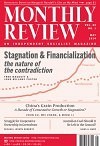Volume 66, Issue 01 (May)

Monthly Review celebrates its sixty-fifth anniversary with this issue. Today the causes for which the magazine has stood throughout its history—the struggle against capitalism and imperialism and the battle for socialism as the only alternative path—are more pressing than ever. Indeed, so great is the epochal crisis of our time, encompassing both the economic and ecological crises, that nothing but a world revolution is likely to save humanity (and countless others among the earth’s species) from a worsening series of catastrophes.…This may seem like a shocking statement; ironically, not so much because of its invocation of the visible threat to humanity’s existence, but rather because of its reference to revolution as the only solution. | more…
The Nature of the Contradiction
More than six years after the beginning of the Great Recession in the United States, and nearly five years since it was officially declared over in this country, the core economies of the capitalist world system remain crisis-ridden. The jobs lost in the downturn in the United States have not yet been fully recovered and the economy remains sluggish. In Europe the crisis has hardly abated at all and a number of the peripheral European Union countries are in what can only be called a depression—especially Greece, Spain, and Portugal. The last member of the triad of advanced capitalist centers, Japan, has gone through what have been called two “lost decades” of slow growth and deflation and is attempting once again to jump-start the economy through a combination of devaluation of the yen and deficit spending. | more…
A Decade of Consecutive Growth or Stagnation?
China’s official statistics showed that the country’s grain production declined from 512 to 431 million tons between 1998 and 2003. However, according to the Chinese government, since 2004 it has achieved “ten years of consecutive growth” in grain production. According to the official statistics, China’s grain production reached 602 million tons in 2013, nearly 40 percent above the 2003 level.… While the official statistics claim grain production has grown rapidly, China’s surging imports of cereals and soybean suggest that its grain production has struggled to catch up with demand.… This article argues that China’s actual grain production levels may be substantially lower than the officially reported levels; in fact, grain production has stagnated since the late 1990s. | more…
Many Australians view themselves as living in a “lucky country” because it has an abundance of mineral resources. James Goodman and David Worth, however, maintain that the mining boom has been a “curse” in disguise. It has sharpened socioeconomic and community divisions, contributed to political conflict, and resulted in “ecological mal-development” with serious environmental consequences. This applies to coal in that it not only contributes to air and water pollution, but is also a major source of carbon dioxide emissions and thus a major contributor to climate change. | more…
The Struggle for Cooperative Ownership in Greensboro, North Carolina
There is much to ponder as the patchwork of American society continues to unravel from the effects of a new type of capitalist depression.… [T]he wealthiest 1% of Americans earned more than 19 percent of the country’s household income in 2012, their biggest share since 1928, a year before the Wall Street stock-market collapse.… [For an alternative to this] we might look to Occupy’s brief history beyond Wall Street—that is, in the cities and towns where its initial energy was so keenly felt, and where it is likely that many of us have since embarked on new projects that carry the potential of a transitional and transformational politics.… Such is the case in Greensboro, North Carolina, a mid-size Southern city known for its struggles for civil rights and socio-economic justice. It is here where the Occupy movement played a small but seminal role in what has become a fierce, grass-roots struggle for cooperative ownership in the African-American community. | more…
Margaret Randall, Che on My Mind (Durham, NC: Duke University Press, 2013), 160 pages, $19.95, paperback.
If you have not been thinking about Che, now you will. Our gifted poet, feminist author, and revolutionary thinker has given us a spare and ethical meditation on the lingering life and death of Ernesto Che Guevara. With infinite care and honesty, Margaret Randall circles deeper and more fully into the liberation ideas and actions that she, and our era, were inspired by and sought—as manifest in the young doctor from Argentina who joined the revolutionary struggle for a liberated Cuba, encouraged and supported rebel forces across the continents of South America and Africa, embodied the hope and anti-imperialism of the third world project, and improbably initiated and fought guerilla armed conflict in the Congo and then Bolivia, where he was killed. | more…
